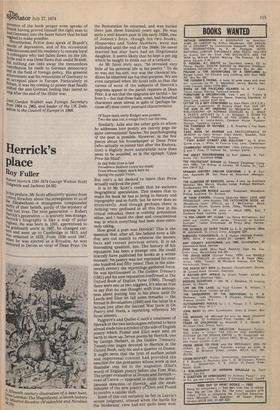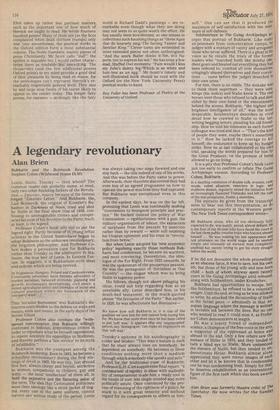Herrick's Place
Roy Fuller
,R(.9.bert Herrick 1591-1674 George Walton Scott k'31dgwick and Jackson £4.50) irn his preface, Mr Scott effectively quotes from .1-rYtton Strachey about the strangeness to us of ine Eliz_abethans-a strangeness compounded It)artlY of their beliefs, partly of the mystery of eIr lost lives. The next generation Robert _errick's generation is scarcely less strange. fierrick's biography is like a map of polar rhe,gions. He. was born in 1591, apprenticed to goldsmith uncle in 1607, he changed car`ers and went up to Cambridge in 1613, and was ordained in 1623. From 1630 until 1647, hen he was ejected as a Royalist, he was rnrnured in Devon as vicar of Dean Prior. On the Restoration he returned, and was buried there just three hundred years ago. He was quite a well-known poet in the early 1620s, one of Jonson's boys, though his two books, Hesperides and Noble Numbers, were not published until the end of the 1640s. He never married but may have had an illegitimate daughter. It seems likely that he kept a pet pig which he taught to drink out of a tankard.
As Mr Scott truly says, "he revealed very little of his personal life in his poetry.' To do so was not his aim, nor was the classical tradition he inherited apt for that purpose. We are even surprised when Mr Scott tells us that the names of some of the subjects of Herrick's epigrams appear in the parish registers at Dean Prior: it is not that the epigrams are tactful far from it but that these bald, mean, bad-breathed characters seem unreal in spite of (perhaps because of!) their comic postcard characteristics:
Of foure teeth onely Bridget was possest; Two she spat out, a cough forc't out the rest.
Similarly, Julia and the other girls to whom he addresses love poetry are merely pegs for quite conventional fancies. No psychologising of the poet is possible. However, in the few pieces about his housekeeper at Dean Prior (who actually re-joined him after the Restoration) a slightly more naturalistic note does seem to be sounded, as in the epitaph 'Upon Prew his Maid': In this little time is laid Prewdence Baldwin (once my maid) From whose happy spark here let
Spring the purple Violet.
But one's a bit dashed to learn that Prew actually outlived the poet! It is to Mr Scott's credit that he eschews biographical speculation. This means that to make his book he has to bring in history and topography and so forth, but he never does so irrelevantly. And though perhaps there is nothing very profound in all this (nor in his critical remarks), there is nothing pretentious either, and I found the clear and conscientious way in which everything had been done extremely taking.
How good a poet was Herrick? This is the question that, after all, lies behind even a life that sets out mainly to rehearse the known facts and correct previous errors. It is an interesting question, too. The history of his reputation has been a strange one. He could scarcely have published his books at a worse moment: his poetry was not reprinted for over one hundred and fifty years! Then in the nineteenth century the reprintings gathered force. He was apotheosised in The Golden Treasury (1861) and his new reputation confirmed in The Oxford Book of English Verse (1900). Though there were one or two nigglers, it's almost true to say that no one thought with true seriousness about putting him in his place until Dr Leavts and Eliot let fall some remarks the former in Revaluation (1936) and the latter in a lecture just after the Second War (now in On Poetry and Poets, a reprinting reference Mr Scott misses). Palgrave's and Quiller-Couch's treatment of Herrick in the two anthologies referred to have almost made him a symbol of the side of English poetry which Pound and Eliot were sent on earth to show up. Seven poems by Herrick, one by George Herbert, in the Golden Treasury. Twenty-one pages devoted to Herrick in the Oxford Book, only six and a quarter to Donne. It might seem that the lyric of surface polish and impersonal content had provided the sanction for the poetasters whose work in not dissimilar vein led to the stagnation (Eliot's word) of English poetry before the First War. The proper evaluation of Donne and Herbert even of Carew appeared to imply the simultaneous demotion of Herrick,. and the establishment of the new poetry of-Eliot and Pound to involve a similar shift.
Some of this can certainly be felt in Leavis's severe judgment, uttered when the battle for the 'modernist' view had not quite been won. Eliot takes up rather less partisan matters, such as the important one of how much of Herrick we ought to read. He wrote fourteen hundred poems! Many of them are (as the Scot complained when dealt thirteen trumps) only wee 'uns: nevertheless, the poetical works in the Oxford edition form a most substantial volume. The Noble Numbers, mainly pieces of pious Christianity, Mr Scott calls "dull": the epithet is arguable but I would rather characterise them as readable but unexciting. The Hesperides (and the few additional poems Oxford prints) to my mind provide a good deal of their pleasures by being read en masse, for the anthologies can't represent Herrick's remarkably respectable general level. They also by and large miss facets of his talent likely to appeal to the reader today. The longer fairy poems, for instance — strikingly like the fairy world in Richard Dadd's paintings — are remarkable even though what they are doing may not seem to us quite worth the effort. He has usually been bowdlerised, so one misses in collections such haunting things as "these Ages that do hoarsely sing/The farting Tanner and familiar King." Clever turns are embedded in more extended pieces not often anthologised: "And the smirk Butler thinks it/Sin, in's Naperie, not to express his wit." He has even a few mad, Stuffed Owl moments: "Fain would I kiss my Julia's dainty leg/Which is as white and hair-less as an egg." Mr Scott's timely and well-illustrated book should be read with the Oxford (or the New York University Press) poetical works to hand.
Roy Fuller has been Professor of Poetry at the University of Oxford.




























 Previous page
Previous page